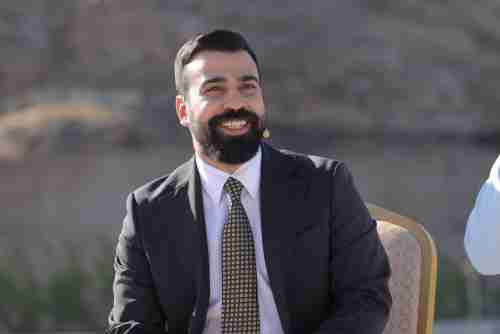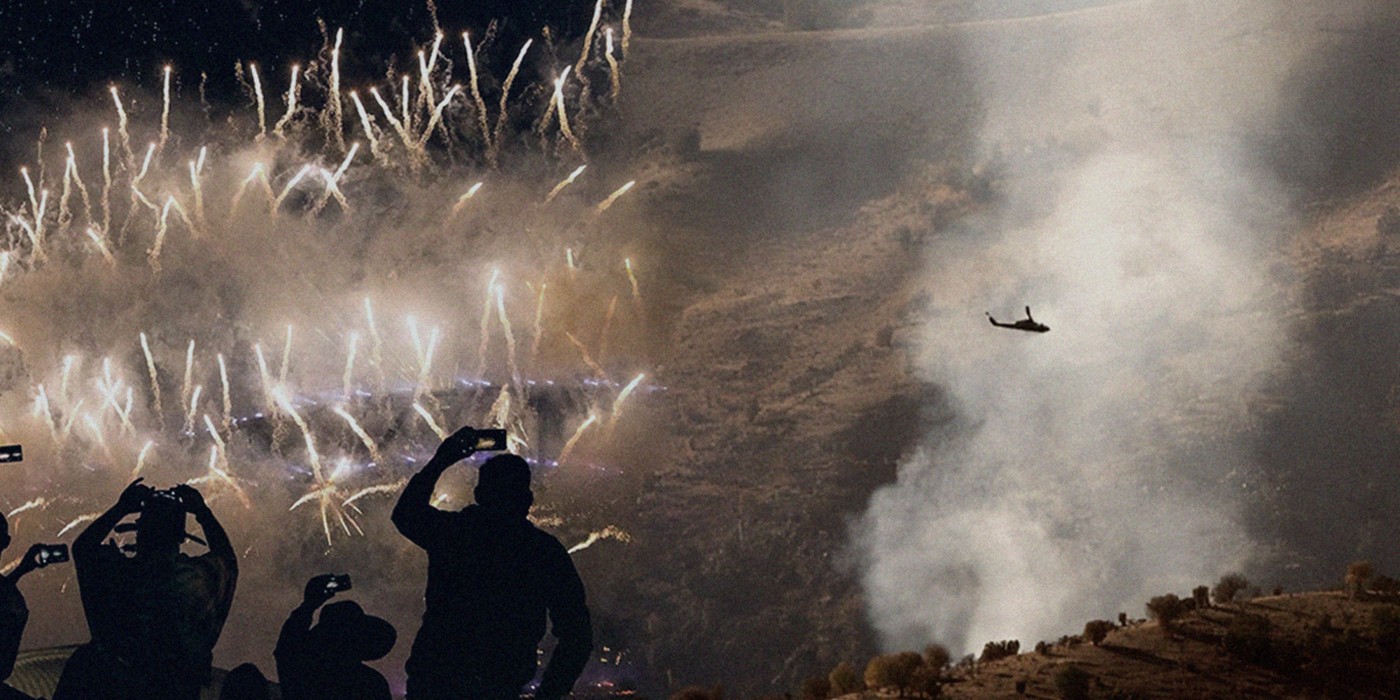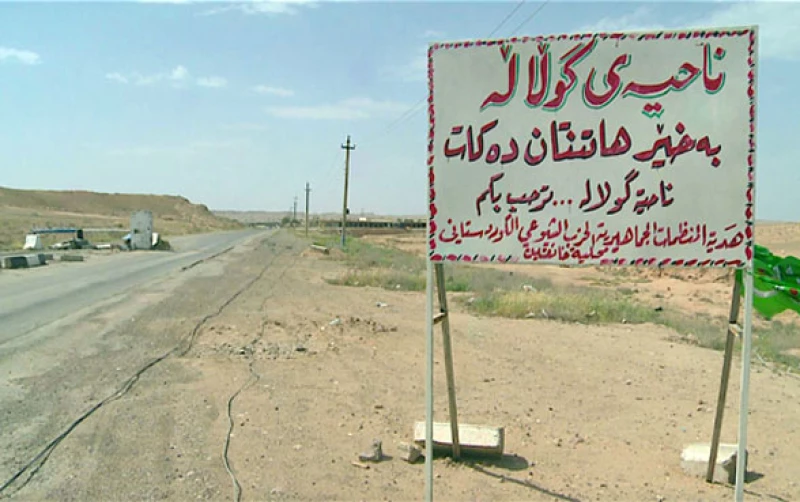ERBIL, Kurdistan Region of Iraq - As the world is just hours away from entering a new year with skies set to light up with fireworks, the skies of the Kurdistan Region, have for weeks seen no respite from drones shot by Iran-backed Iraqi armed groups.
On Sunday, the Kurdistan Regional Government announced that a Peshmerga base located in Pirmam, northeast of Erbil, had been targeted with a one-way attack drone late Saturday night, with no casualties reported.
Kurdistan under fire
The Saturday attack is the latest in a series of similar incidents that have targeted the Region over the past two months.
The Islamic Resistance in Iraq, which is a network of Iran-backed armed groups, has previously claimed responsibility for the majority of these attacks, under the pretext of targeting ‘Israeli bases’ and American troops and missions operating in the Kurdistan Region.
In a video published on their Telegram channel on Saturday, the Islamic Resistance in Iraq claimed responsibility for another attack on Erbil.
The caption of the video reads “Scenes from the targeting of the invading American base in Harir, near Erbil airport, by the Islamic Resistance in Iraq.”
The Kurdistan Region has popularly been perceived as an outstanding example of peaceful coexistence and stability in an area surrounded by conflict.
Despite continuous reaffirmations from the US that the Region is a good friend of Washington, and Baghdad’s continuous claims of treating the people and land of the Kurdistan Region as its own, neither side has been able to put an end to the continuous attacks.
It seems as though the US and Iran are settling scores, with the Kurdistan Region caught in the crossfire, serving as the battlefield for their conflicts.
The Prime Minister of the Kurdistan Region, Masrour Barzani, has issued a strongly worded series of tweets, urging Iraqi Prime Minister Mohammed Shia’ al-Sudani to take decisive action.
“I condemn the outlaws and their collaborators in the strongest terms possible,” PM Barzani said in his tweets. “We know well the issues at play here and the outlaws behind them and have a right to defend our people.”
The KRG spokesperson further condemned the attack in a statement.
“The Kurdistan Regional Government holds the groups and the federal government responsible for this cowardly attack. The outlaws are paid and armed by the federal government, moving weapons and missiles in plain sight to target public infrastructure and military installations,” read the statement from Peshawa Hawramany, the spokesperson.
Hawramany further added that the KRG reserves the right to defend its people, urging its partners “to support any response and unequivocally condemn these acts of terrorism.”
The KRG has consistently rejected claims made by the Iran-backed militias claiming that the Region hosts Israeli bases or intelligence services, and the US led coalition forces based in Erbil, as reiterated by the Iraqi government multiple times, are in Iraq upon the request of the Iraqi government, despite these clarifications, the attacks continue.
As Iran continues to target the West's main ally in the region, through its proxy groups, the Kurdistan Region remains threatened without possessing any air defense system.
Even though the US Congress passed a bill earlier in December that includes equipping the Peshmerga and Iraqi forces with air defense systems, it is still unclear when or if the bill will be put into execution.
“Government officials in Washington were informed about yesterday’s attack in the Kurdistan Region. They expressed concern about the increasing escalation of attacks, especially against the KRG now,” KRG representative in Washington Treefa Aziz told the New Region on Sunday.
In the meantime, the Kurdistan Region’s land is under the threat of one-way attack drones directed at US troops and allies who fought alongside the US in the war against ISIS.
Iraqi Prime Minister Sudani, on Sunday, ordered an intensive investigation into the attack on the Peshmerga base in Pirmam, describing it as a criminal act.
Nevertheless, over the past three years, various militias affiliated with the Popular Mobilization Forces (PMF), an Iran-backed Iraqi armed group officially incorporated into the Iraqi military, have claimed responsibility for attacks on diplomatic missions and bases hosting foreign troops in both Iraq and the Kurdistan Region.
The PMF, which has strong ties with the Islamic Revolutionary Guard Corps (IRGC), was established upon the religious decree of Iraqi Shia Marja’ Ayatollah Ali al-Sistani in order to fight ISIS.
Following the territorial defeat of ISIS, the PMF was integrated into the Iraqi military and is consequently funded by the Iraqi government.
I'm deeply alarmed by last night's terrorist attack on a Peshmerga base northeast of Erbil. I condemn the outlaws and their collaborators in the strongest terms possible.
We know well the issues at play here and the outlaws behind them, and have a right to defend our people.
Open-door policy
The Kurdistan Region has served as a safe haven for people in Iraq for many years. During the civil war in Syria and the ISIS takeover of parts of Iraq, thousands of displaced families sought refuge in the Region's camps, with many of whom still reside there today.
According to UNHCR, out of the 300,000 refugees in Iraq, 90 percent reside in the Kurdistan Region, while approximately 180,000 internally displaced persons (IDPs) live in the region.
Economic strains and the way forward
Despite facing threats from Iran-backed armed groups, the Kurdistan Region has also experienced significant economic isolation from Baghdad. The Kurdistan Region's Prime Minister Barzani has, on several occasions, reassured that the KRG has fulfilled all demands made by Baghdad to resume the federal government's delivery of civil servants' salaries. However, the Region's civil servants are still waiting for Baghdad to allocate their share of the budget.
In light of recent aggressions, the Kurdistan Regional Government (KRG) remains committed to a peaceful approach in resolving disputes.
Prime Minister Barzani conveyed this sentiment to diplomats during a closed meeting earlier this month, stating, "Conflicts can be resolved if addressed promptly, before escalating to military
confrontation."



 Facebook
Facebook
 LinkedIn
LinkedIn
 Telegram
Telegram
 X
X


